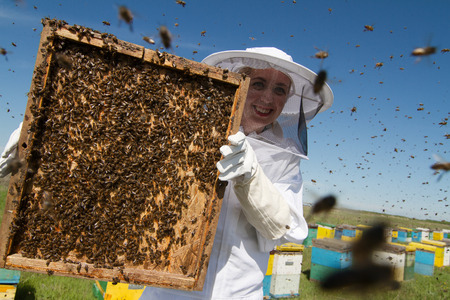What Can the US Learn from Slovenian Beekeepers?
March 04, 2019
Recent bee declines throughout the world have prompted many to speculate on the possibility of living in a world without the essential pollinators and, as a result, the food that’s made available to us through their efforts. However, in the country of Slovenia, these worries are practically unheard of, as the colonies are allegedly thriving there. Among its population of roughly two million, Slovenia, wedged between Austria, Croatia, and Italy, has roughly 10,000 beekeepers whereas the United States has about 125,000 beekeepers in its nation of around 327 million. Many have attributed this heavy concentration of beekeepers to the Slovenian populace’s ingrained love of honey and bees, its historic beekeeping ties, as well as a government that acknowledged the benefits beekeeping had to its economy early.
According to Gorazd Trušnovec, an urban beekeeper who inspects the Slovenian prime minister’s beehives, “Maybe taking care of bees is just in our blood.” For the U.S., commercial beekeepers with over 300 hives each produce roughly 60 percent of America’s honey supply. However, from April 2017 to April 2018, U.S. beekeepers lost around 40 percent of their colonies to habitat loss, pesticides, mite infestations, rapidly-spreading diseases, and colony collapse disorder.
“The ramifications of pollinator loss, and insect loss generally, is an unraveling of the fabric that holds life on earth together,” Phyllis Stiles, who founded Bee City USA, said. While there are many U.S. initiatives right now supporting declining honey bee populations, advocates say they need a concentrated, national effort in order to protect honey bees and similar pollinators—which is where the lessons of Slovenia enter the picture. “Beekeeping is something we just really like to do,” Nika Jere, who has 300 hives and whose family is among the largest honey producers in Slovenia, said.
Making a honey business successful takes serious hard work, but Slovenia’s government is also a huge ally, as the nation put various regulations and policies in place to protect honey bees, including the 2002 decision to give the Carniolan honey bee conservation status and to prevent non-native bees from being imported. Slovenia has even established training courses to ensure beekeepers in the future have the experience and knowledge necessary for keeping bees. Slovenia also offers free treatment and medication for combating varroa mites as well as offering full refunds for infected colonies, thus preventing infestations from spreading.
Perhaps the most surprising fact, however, is that Slovenian beehives have never seen full-fledged colony collapse disorder. They have faced difficulties, such as in 2011 when some areas had dramatic increases in bee deaths that were thought to be the product of pesticide overuse, which prompted the government to quickly move to ban various harmful pesticides. “I think bees here are so healthy because there is so much awareness about how important they are—it’s a hot topic for the public, and beekeepers know their responsibility,” says Jere. “And for the government and the ministry of agriculture, it’s really important as well, so there are a lot of rules and inspections.”
Ready to try the rich flavor of Manuka honey? To learn more about this honey or to get an order started, please click here. And, remember, we offer FREE shipping on all orders of $150 or more!


.jpg)




